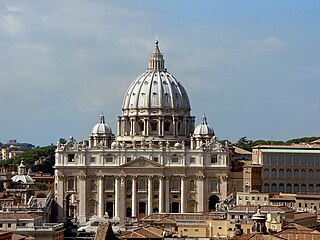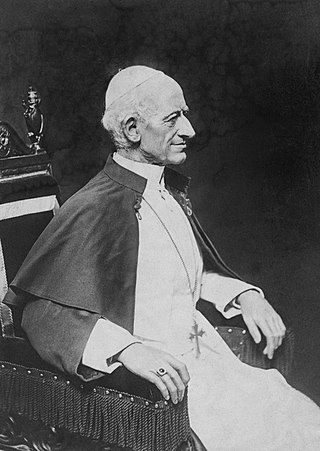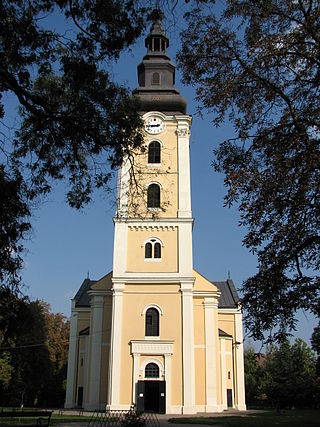The Roman Curia comprises the administrative institutions of the Holy See and the central body through which the affairs of the Roman Catholic Church are conducted. The Roman Curia is the institution which the Roman Pontiff ordinarily makes use of in the exercise of his supreme pastoral office and universal mission in the world. It is at the service of the Pope, successor of Peter, and of the Bishops, successors of the Apostles, according to the modalities that are proper to the nature of each one, fulfilling their function with an evangelical spirit, working for the good and at the service of communion, unity and edification of the Universal Church and attending to the demands of the world in which the Church is called to fulfill its mission.

The Second Ecumenical Council of the Vatican, commonly known as the Second Vatican Council or Vatican II, was the 21st and most recent ecumenical council of the Catholic Church. The council met in Saint Peter's Basilica in Vatican City for four periods, each lasting between 8 and 12 weeks, in the autumn of each of the four years 1962 to 1965.

Ecumenism – also called interdenominationalism, or ecumenicalism – is the concept and principle that Christians who belong to different Christian denominations should work together to develop closer relationships among their churches and promote Christian unity. The adjective ecumenical is thus applied to any non-denominational initiative that encourages greater cooperation and union among Christian denominations and churches.

In politics, integralism, integrationism or integrism is an interpretation of Catholic social teaching that argues the principle that the Catholic faith should be the basis of public law and public policy within civil society, wherever the preponderance of Catholics within that society makes this possible. Integralism is anti-pluralist, seeking the Catholic faith to be dominant in civil and religious matters. Integralists uphold the 1864 definition of Pope Pius IX in Quanta cura that the religious neutrality of the civil power cannot be embraced as an ideal situation and the doctrine of Leo XIII in Immortale Dei on the religious obligations of states. In December 1965, the Second Vatican Council approved and Pope Paul VI promulgated the document Dignitatis humanae–the Council's "Declaration on Religious Freedom"–which states that it "leaves untouched traditional Catholic doctrine on the moral duty of men and societies toward the true religion and toward the one Church of Christ". However, they have simultaneously declared "that the human person has a right to religious freedom," a move that some traditionalist Catholics such as Archbishop Marcel Lefebvre, the founder of the Society of St. Pius X, have argued is at odds with previous doctrinal pronouncements.
The relations between the Catholic Church and the state have been constantly evolving with various forms of government, some of them controversial in retrospect. In its history, the Church has had to deal with various concepts and systems of governance, from the Roman Empire to the medieval divine right of kings, from nineteenth- and twentieth-century concepts of democracy and pluralism to the appearance of left- and right-wing dictatorial regimes. The Second Vatican Council's decree Dignitatis humanae stated that religious freedom is a civil right that should be recognized in constitutional law.

Rerum novarum, or Rights and Duties of Capital and Labor, is an encyclical issued by Pope Leo XIII on 15 May 1891. It is an open letter, passed to all Catholic patriarchs, primates, archbishops and bishops, that addressed the condition of the working classes.

The Catholic Church in the United States is part of the worldwide Catholic Church in communion with the pope. With 23 percent of the United States' population as of 2018, the Catholic Church is the country's second-largest religious grouping after Protestantism, and the country's largest single church if Protestantism is divided in the separate denominations. In a 2020 Gallup poll, 25% of Americans said they were Catholic. The United States has the fourth-largest Catholic population in the world, after Brazil, Mexico, and the Philippines.

The Catholic Church, also known as the Roman Catholic Church, is the largest Christian church, with 1.28 to 1.39 billion baptized Catholics worldwide as of 2024. It is among the world's oldest and largest international institutions and has played a prominent role in the history and development of Western civilization. The church consists of 24 sui iuris churches, including the Latin Church and 23 Eastern Catholic Churches, which comprise almost 3,500 dioceses and eparchies around the world. The pope, who is the bishop of Rome, is the chief pastor of the church. The Diocese of Rome, known as the Holy See, is the central governing authority of the church. The administrative body of the Holy See, the Roman Curia, has its principal offices in Vatican City, a small independent city-state and enclave within the Italian capital city of Rome, of which the pope is head of state.
Americanism was, in the years around 1900, a political and religious outlook attributed to some American Catholics and denounced as heresy by the Holy See.
Catholic social teaching (CST) is an area of Catholic doctrine which is concerned with human dignity and the common good in society. It addresses oppression, the role of the state, subsidiarity, social organization, social justice, and wealth distribution. CST's foundations are considered to have been laid by Pope Leo XIII's 1891 encyclical, Rerum novarum, which advocated distributism. Its roots can be traced to Catholic theologians such as Thomas Aquinas and Augustine of Hippo. CST is also derived from the Bible and cultures of the ancient Near East.
The Dicastery for Interreligious Dialogue, previously named Pontifical Council for Interreligious Dialogue (PCID), is a dicastery of the Roman Curia, erected by Pope Paul VI on 19 May 1964 as the Secretariat for Non-Christians, and renamed by Pope John Paul II on 28 June 1988.

The Catholic Church and politics concerns the interplay of Catholicism with religious, and later secular, politics. The Catholic Church's views and teachings have evolved over its history and have at times been significant political influences within nations.
Pacem in terris is a papal encyclical issued by Pope John XXIII on 11 April 1963, on the rights and obligations of people and their states, as well as proper interstate relations. It emphasizes human dignity and human equality in endorsing women's rights, nuclear nonproliferation and the United Nations.

Carlo Maria Martini was an Italian Jesuit, cardinal of the Catholic Church and a Biblical scholar. He was Archbishop of Milan from 1980 to 2004 and was elevated to the cardinalate in 1983. A towering intellectual figure of the Roman Catholic Church, Martini was the liberal contender for the Papacy in the 2005 conclave, following the death of Pope John Paul II. According to highly placed Vatican sources, Martini received more votes in the first round than Cardinal Joseph Ratzinger, the conservative candidate: 40 to 38. Ratzinger ended up with more votes in subsequent rounds and was elected Pope Benedict XVI.

The Catholic Church in Japan is part of the worldwide Catholic Church, under the spiritual leadership of the pope in Rome. As of 2021, there were approximately 431,100 Catholics in Japan, 6,200 of whom are clerics, religious and seminarians. Japan has 15 dioceses, including three metropolitan archdioceses, with 34 bishops, 1,235 priests, and 40 deacons spread out across 957 churches.
Members of the Catholic Church have been active in the elections of the United States since the mid-19th century. The United States has never had religious parties. There has never been an American Catholic religious party, either local, state or national.

The Hungarian Greek Catholic Church or the Byzantine Catholic Church in Hungary is a sui iuris (autonomous) Eastern Catholic church based in Hungary. As a particular church of the Catholic Church, it is in full communion with the Holy See. Its liturgical usage is that of the Byzantine Rite in the Hungarian language.
The history of the Catholic Church is the formation, events, and historical development of the Catholic Church through time.
The orders, decorations, and medals of the Holy See include titles, chivalric orders, distinctions and medals honoured by the Holy See, with the Pope as the fount of honour, for deeds and merits of their recipients to the benefit of the Holy See, the Catholic Church, or their respective communities, societies, nations and the world at large.
The Dicastery for Culture and Education is an administrative unit of the Roman Curia. It began operations on 5 June 2022 as established by the apostolic constitution Praedicate evangelium promulgated on 19 March 2022. It was formed through the merger of two earlier bodies, the Pontifical Council for Culture and the Congregation for Catholic Education.









